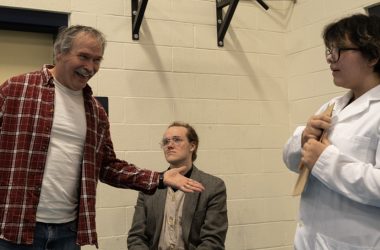
courtesy photo
Colby Lynch is one of the people featured in Vermont filmmaker Bess O’Brien’s new documentary “Just Getting By.”
BARNET – Ten years after her documentary on drug use disorder inspired a gubernatorial State of the State address, Bess O’Brien turns her focus to locals struggling to pay for food and shelter.
A Vermonter who identifies herself only as Katelyn is explaining how, five months pregnant in the coldest confines of winter, she had to sleep on the street.
“The very first thing my grandmother had said to me was, ‘I hope you didn’t just get pregnant so you could live off the state,’” she recently recalled. “People have this idea in their head that we’re all just these bums and we’re living it up. We’re not. Not in any way, shape or form.”
That sentiment is seconded by a retired woman, a veteran, a refugee and family of seven — all who are skipping meals and living in cars, tents or motel rooms for lack of enough money.
“We have a picture of quaint Vermont with our strong villages and community fabric,” said Ken Russell, executive director of Montpelier’s Another Way peer support center. “There’s a tear in all of this.”
That’s why filmmaker Bess O’Brien has captured all of those voices in her new documentary “Just Getting By, which is set to tour the state this spring in hopes of mending that rip and tying people back together.
O’Brien — whose drug use disorder feature “The Hungry Heart” made national news after it inspired Gov. Peter Shumlin’s 2014 State of the State address — fashions her newest work from personal stories found at local food banks, soup kitchens, emergency shelters and social service agencies.
Unlike O’Brien’s past projects, which spotlight a few individuals, “Just Getting By” opens with person upon person seeking help at place upon place.
“I’m often asked, ‘Who are the people you would see in the dining room if I come by?’” Deacon Bob Begley is shown saying at Martha’s Community Kitchen in St. Albans. “You’re going to see someone’s mother, someone’s father, grandfather, grandmother, grandson, your neighbor … These are the people in our community.”
The dizzying pace of the documentary’s opening punctuates one of its points: The problem of poverty is overwhelming for everyone.
One social worker is pictured finding three to five available apartments “on a good day” to serve upward of 125 families staying at area motels.
“We have a less than 1% vacancy rate for affordable housing,” Sherry Marcelino of Lamoille County Mental Health Services says in the film.
People who barely earn minimum wage, for their part, are seen struggling with finances even if they find housing.
“How are you going to pay $1,200 for a one bedroom when you’re making $15 an hour?” Colby Lynch says to the camera before losing her government-paid room at Barre’s Quality Inn.
People also face bills for electricity, gas and, what many in the film say they forgo first, food.
“You remember the dollar store?” one man says. “Things were a dollar. Not anymore.”
Spliced together, the documentary shows the challenges and complications of living on, in the case of one man with an oxygen mask, $391 a month in Social Security.
“I don’t think it’s so much that people in power don’t want the best for the community,” advocate Brenda Siegel is pictured saying. “I think it’s that they really don’t understand poverty.”
Based in the Northeast Kingdom town of Barnet, O’Brien spent two years working to raise production money, then film and edit 95 hours of footage into a 95-minute feature.
When O’Brien began interviewing subjects in the fall of 2022, she didn’t know she’d be ending her work as some 800 people lost eligibility for government-paid motel rooms last summer.
“You do see some moments of hope,” the filmmaker, in an interview, said of what she witnessed in between. “There are a lot of things that people can do, and communities are reaching out and trying to help.”
But the documentary also includes local leaders who note the size of the problem isn’t something they can tackle, especially now that the state and federal government are cutting support after several years of COVID-19 pandemic aid.
“To expect that we would have the resources to deliver housing services and support services and mental health services and social services is really unrealistic,” Montpelier City Manager Bill Fraser says in the film. “We don’t have the staffing. We don’t have the expertise. We certainly don’t have the funding to take this on.”
Tackling social issues is a running theme in O’Brien’s seven other documentaries, from 1998’s “Where Is Stephanie?” about the life and murder of a 17-year-old Rutlander; to 2011’s “Ask Us Who We Are,” about the state’s foster care system; to 2018’s “Coming Home,” about Vermonters being released from prison.
O’Brien is set to premiere “Just Getting By” in Burlington, followed by shows later this month and into April in Brattleboro, Greensboro, Middlebury, Montpelier, Morrisville, Randolph, Rutland, St. Albans and St. Johnsbury, with the schedule available on the film’s website.
Although O’Brien will take questions at each screening, she can’t promise solutions.
“This is a film that doesn’t have all the answers,” she said. “It’s a big issue that needs a bold, long-term focus.”
O’Brien is set to show “Just Getting By” in Greensboro on April 4, at 7 p.m., at the Highland Center for the Arts, 2875 Hardwick St. Advance tickets are available or at the door.







